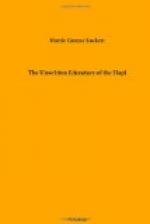[Footnote 5: Hough, Walter, The Hopi: Torch Press, Cedar Rapids, 1915.]
To a visitor encamped at bedtime below the mesa, the experience of hearing the speaker chief or town crier for the first time is something long to be remembered. Out of the stillness of the desert night comes a voice from the house tops, and such a voice! From the heights above, it resounds in a sonorous long-drawn chant. Everyone listens breathlessly to the important message and it goes on and on.
The writer recalls that when first she heard it, twenty years ago, she sat up in bed and rousing the camp, with stage whispers (afraid to speak aloud), demanded: “Do you hear that? What on earth can it mean? Surely something awful has happened!” On and on it went endlessly. (She has since been told that it is all repeated three times.) And not until morning was it learned that the long speech had been merely the announcement of a rabbit hunt for the next day. The oldest traditions of the Hopi tell of this speaker chief and his important utterances. He is a vocal bulletin board and the local newspaper, but his news is principally of a religious nature, such as the announcement of ceremonials. This usually occurs in the evening when all have gotten in from the fields or home from the day’s journey, but occasionally announcements are made at other hours.
The following is a poetic formal announcement of the New Fire Ceremony, as given at sunrise from the housetop of the Crier at Walpi:
“All people awake, open your eyes, arise, Become children of light, vigorous, active, sprightly: Hasten, Clouds, from the four world-quarters. Come, Snow, in plenty, that water may abound when summer appears. Come, Ice, and cover the fields, that after planting they may yield abundantly. Let all hearts be glad. The Wuwutchimtu will assemble in four days; They will encircle the villages, dancing and singing. Let the women be ready to pour water upon them That moisture may come in plenty and all shall rejoice."[6]
[Footnote 6: Hough, Walter, Op. cit., p. 43.]
As to the character of their government, Hewett says:[7] “We can truthfully say that these surviving pueblo communities constitute the oldest existing republics. It must be remembered, however, that they were only vest-pocket editions. No two villages nor group of villages ever came under a common authority or formed a state. There is not the faintest tradition of a ‘ruler’ over the whole body of the Pueblos, nor an organization of the people of this vast territory under a common government.”
[Footnote 7: Hewett, E.L., Ancient Life in the American Southwest: Bobbs-Merrill Co., Indianapolis, 1929, p. 71.]
=The Clan and Marriage=
Making up the village are various clans. A clan comprises all the descendants of a traditional maternal ancestor. Children belong to the clan of the mother. (See Figure 1.) These clans bear the name of something in nature, often suggested by either a simple or a significant incident in the legendary history of the people during migration when off-shoots from older clans were formed into new clans. Thus a migration legend collected by Voth[8] accounts for the name of the Bear Clan, the Bluebird Clan, the Spider Clan, and others.




